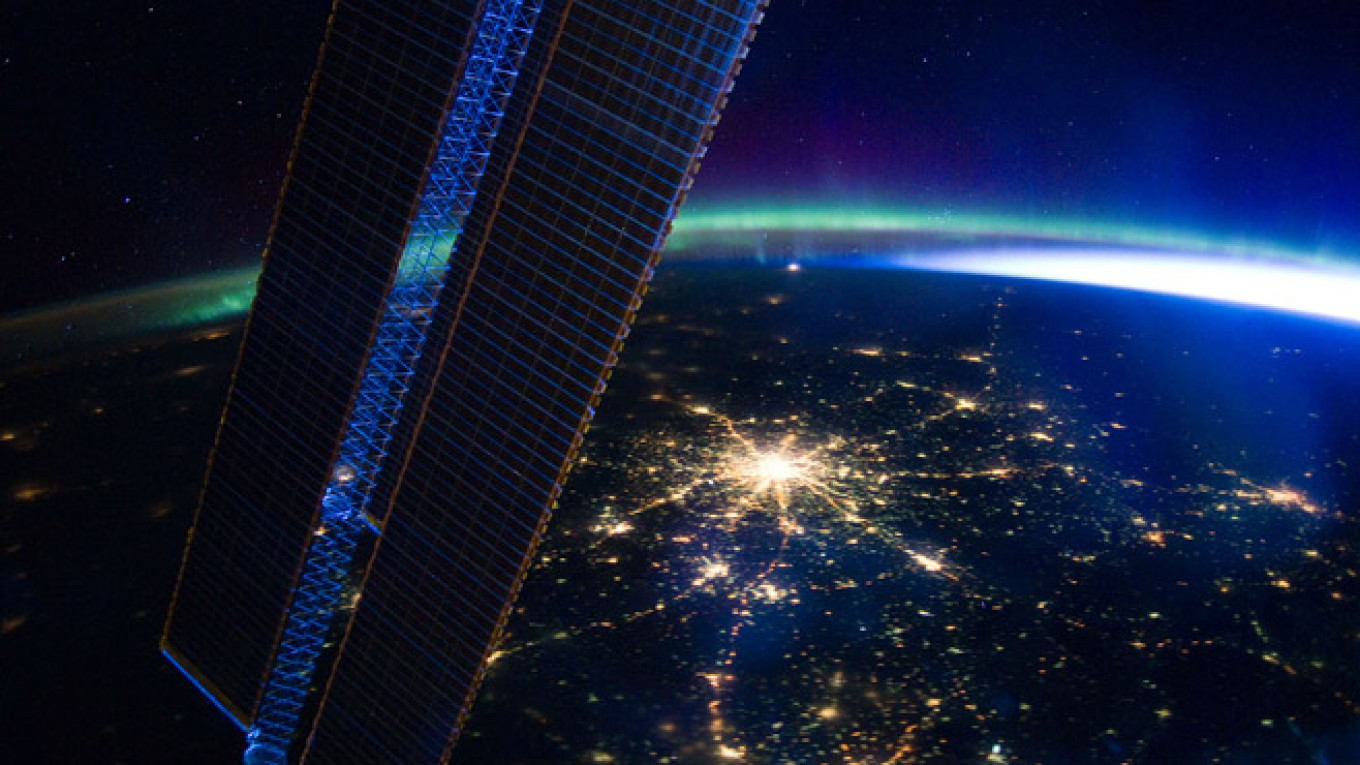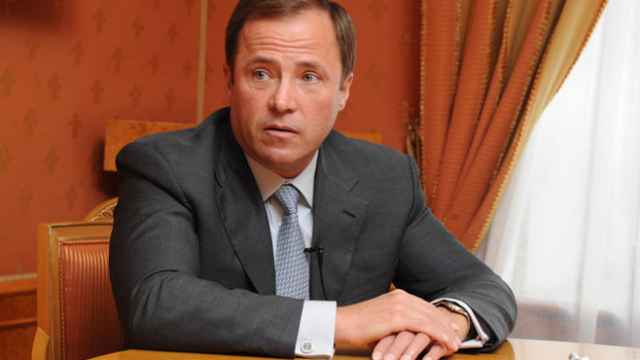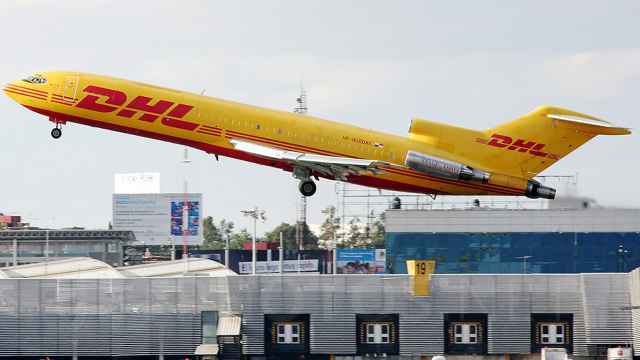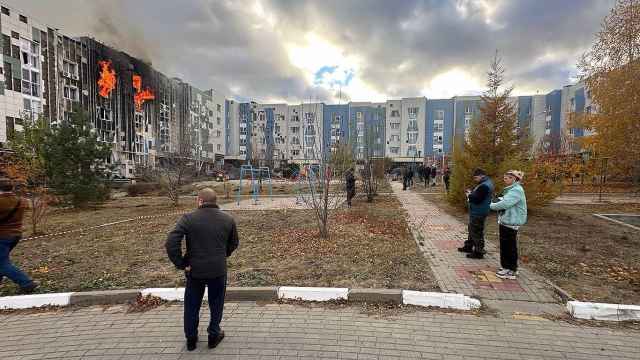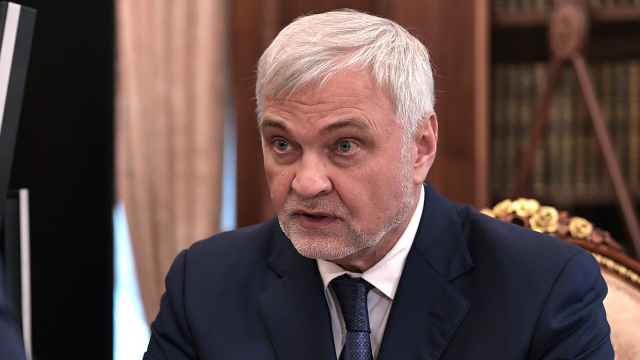An ambitious drive by a friend of President Vladimir Putin’s to take control of Russia’s defense industry may be behind a shock announcement this week that Russia would merge its federal space agency with a major industry group, analysts said.
Prime Minister Dmitry Medvedev took industry observers by surprise on Wednesday night with the announcement that the United Rocket and Space Corporation (URSC), a state corporation that manufactures space equipment, would be merged with Roscosmos, the federal agency that dictates and enacts space policies.
But while the new agency will also be called Roscosmos, it will be headed not by aerospace veteran and Roscosmos chief Oleg Ostapenko, but by URSC chief Igor Komarov, whose last job was in the commercial sector as the head of Russia’s largest carmaker, AvtoVAZ.
Komarov’s new job title, analysts said, points toward one man — Sergei Chemezov, head of the state defense behemoth Rostec, which until last year owned the AvtoVAZ brand and still retains a significant share in the company.
Komarov’s move, and Roscosmos’ liquidation, bear close similarities to the unexpected appointment of a Rostec loyalist to head up major aeronautics company United Aircraft Corporation chief just last week, a move that also sent shock waves across the air and space industry.
Chemezov, formerly Putin’s mentor during their time together in the KGB, appears to be snapping up market share in a push that, analysts said, is likely to put profit over science.
Ongoing Reform
The move unites the entirety of Russia’s space program — the industrial concerns of URSC responsible for building hardware for use by Roscosmos to conduct space missions — under the umbrella of a new state company.
Ostensibly aimed at increasing efficiency through centralization, the murky world of Russian state corporations may work to further deepen the space sector’s problems.
Yury Karash, a space policy expert at the Russian Academy of Cosmonautics, noted that Roscosmos’s former division enabled each section to hold the other responsible for the quality of its work. This week’s shake-up, according to Karash, is just bureaucratic competition within the industry.
“An independent Russian Space Agency was one bulwark, however shaky, against [corruption], and now that it’s gone,” said Dr. James Oberg, a retired rocket scientist in Houston and long-time follower of the Russian space program.
“I fear a lot more beaks will be wet from diverting funds from space budgets,” he said.
Changing Priorities?
These organizational changes and bureaucratic squabbles, however, overlook the industry’s need for deeper reforms focusing on human resources and technological research.
“The space industry is now unable to create new technology or advanced spacecraft, leaving it unable to execute the federal space program’s orders,” said Russian space industry analyst Pavel Luzin.
Deputy Prime Minister Dmitry Rogozin, who oversees the space and defense industries, has been a strong proponent of a industry consolidation, believing centralization to be the key to turning things around.
In 2013, when proposals for sweeping space industry reform were being presented to the government, Rogozin backed reforming the space industry on the model of Rosatom, the conglomerate that unites Russia’s atomic industries.
Rosatom, a state corporation descended from the Soviet Ministry of Medium Machine Building, has proven to be successful exporter of Russian nuclear technology following its creation in 2007.
But if Roscosmos’s aim is to become a new Rosatom, its priority will be to make money off existing hardware — a state the underfunded space program has already been in since 1991.
According to Karash, the prospects for Russia to break free of its tendency to commercialize old tech instead of developing new things is unlikely: “There is no coherent and logical space policy in Russia. Whatever happens serves the interests of separate groups, not national interests.”
Minister Chemezov
In this case, the interest group being served by the Roscosmos merger is that of Putin ally and long-time personal friend Sergei Chemezov, according to Luzin.
Chemezov has recently used his position as head of Rostec and his personal connections to Putin to establish himself as the de-facto shadow defense industry minister, according to Maxim Pyadushkin, the editor of Russian aviation industry publication ATO.ru, as well as a source close to the defense industry.
Under the leadership of Roscosmos’s new head Komarov, an ally of Chemezov, the chances are greater that Russia will forgo extending its participation in international projects like the International Space Station beyond its 2020 deadline and instead go for building a new national space station based on old plans.
This course of action is preferable from an industry standpoint, analysts said. If securing state resources becomes the primary objective, a national space station stands the best chance of scooping up the most cash. Extending participation in ISS, on the other hand, stands on an appeal to cost-saving and resource-sharing.
Bad News for Science?
The merger is perhaps worse news for Russia’s struggling space science program than for the ISS. Although the Soviet Union was a true pioneer in unmanned space exploration, perpetual funding issues since the end of the Soviet Union have brought scientific progress to a crawl in Russia’s space program.
Chemezov’s influence will likely push the focus further away from space science research into defense-relevant projects, which promise the most money. Russia’s Finance Ministry announced last week that spending on the 2015 federal budget will be reduced in all sectors by 10 percent, with the exception of the defense industry.
Lev Zeleny, the director of the Russian Academy of Science’s Space Studies Institute declined to comment on what this means for space science when asked by The Moscow Times on Thursday.
However, Karash of the Academy of Cosmonautics said that “space science programs will most likely just remain at the ‘propaganda’ level, with just enough funding for the state-controlled media to create an impression that Russian space science is still alive.”
Oberg argues that “the West should derive no satisfaction from the difficulties that the Russian space program still struggles with. Not only are our major programs intertwined through mutual dependency, but the near-total absence of Russian scientific space missions is a loss to world science.”
Correction: An earlier version of this article said Rostec owned car maker AvtoVAZ. In fact, Rostec reduced its stake in the company last year to below 50 percent.
Contact the author at m.bodner@imedia.ru
A Message from The Moscow Times:
Dear readers,
We are facing unprecedented challenges. Russia's Prosecutor General's Office has designated The Moscow Times as an "undesirable" organization, criminalizing our work and putting our staff at risk of prosecution. This follows our earlier unjust labeling as a "foreign agent."
These actions are direct attempts to silence independent journalism in Russia. The authorities claim our work "discredits the decisions of the Russian leadership." We see things differently: we strive to provide accurate, unbiased reporting on Russia.
We, the journalists of The Moscow Times, refuse to be silenced. But to continue our work, we need your help.
Your support, no matter how small, makes a world of difference. If you can, please support us monthly starting from just $2. It's quick to set up, and every contribution makes a significant impact.
By supporting The Moscow Times, you're defending open, independent journalism in the face of repression. Thank you for standing with us.
Remind me later.


